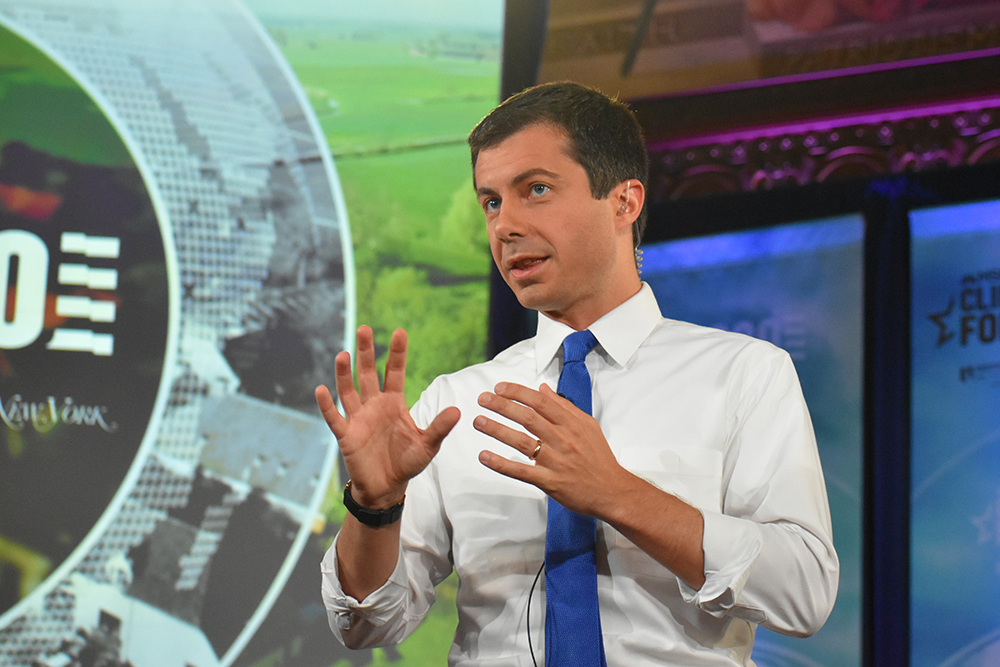Human encounters and on-the-ground campaigning are vital to the success of a presidential run, former presidential candidate Pete Buttigieg said in a virtual Zoom event March 31.
Buttigieg, the former mayor of South Bend, Ind., became the first openly gay Democratic candidate to run for president in the United States when he launched his campaign in April 2019. The Indiana politician quickly garnered national attention and support for his presidential campaign, most notably winning the 2020 Iowa caucuses after a Feb. 27 recount of the Feb. 3 caucus, leading Sen. Bernie Sanders (I-Vt.) by a small margin. After a disappointing fourth-place finish in the South Carolina primary, however, Buttigieg decided to end his campaign March 1.
During the event, titled “Reflections on Running: A Conversation with Mayor Pete Buttigieg,” Buttigieg reflected on his nearly yearlong campaign and discussed what he learned about U.S. citizens during the campaign process. Future presidential elections should place a greater emphasis on in-person campaigning rather than TV commercials and other forms of money-based campaigning, according to Buttigieg.

“Whatever we come up with, I think it is really important that it be an approach that still makes it possible with eye-to-eye, in-person, in-your-face campaigning to cut through the media clutter and to get beyond the forms of attention that really can’t be bought by whoever has the most money to buy TV commercials,” Buttigieg said.
Campaigns are less often built on money or name recognition and more often on genuine interactions with voters, according to Buttigieg.
“The beauty of the process — the whole reason it can’t simply be bought by the person with the most money, the reason it is not simply handed to the person with the most name recognition — is that you have to go backyard by backyard, diner by diner, with crowds that started from eight or 12 or 20 in order to build the kind of campaign that could eventually have a crowd of 10,000,” Buttigieg said.
Buttigieg was one of the first Democratic presidential candidates to appear on a Fox News town hall, something many other Democratic candidates refused to do because of the network’s constant attacks against the Democratic party, according to CNN.
By appearing on platforms like Fox News, candidates can get their messages across to more voters, especially voters that may not initially support their campaign platforms, Buttigieg said.
“I also think you can’t be surprised if people don’t hear your message if they literally don’t hear your message because you have never been inside their media bubble,” Buttigieg said. “We tried to cover as much ground as we could knowing we weren’t going to come into a national conversation and immediately overtake U.S. senators or former vice presidents or cabinet secretaries but that we could at least establish a voice and gather some kind of following.”
The virtual event was co-hosted by the Georgetown Institute of Politics and Public Service, Georgetown University College Democrats and the Georgetown Bipartisan Coalition as part of the GU Politics “Reflections on Running” series. The series, which was launched in 2016, aims to bring former presidential hopefuls to campus to discuss the lessons they took away from the campaign trail, according to the GU Politics website.
As the first openly gay Democratic presidential candidate, Buttigieg acknowledged the importance of representing a certain identity without letting it define you or your campaign.
“For us, what we realized was the most important thing was to be very clear and upfront and true to who I was and at the same time never allow it to appear that I was running to be the president of gay America,” Buttigieg said. “I was just running to be the president of the United States of America.”
Buttigieg, who is 38 years old, was also the youngest candidate in the 2020 primary race and ran on a platform of generational change.
Rather than rushing to run for office, young people who are interested in politics should first focus on following their passions and developing the necessary skills and experience, Buttigieg said.
“What I would encourage anybody to do or to think about if you think you might have a future running for office is not to get too hung up on some game plan to run for this office or that office, but rather arm yourself with as many skills as you can and then look for ways you can make a difference,” Buttigieg said. “If you focus on the issues you care about and follow that wherever it takes you — and it might be activism or office or scholarship — that’s going to be a much more authentic path.”
This article has been updated to clarify that Buttigieg was the first openly-gay Democratic presidential candidate.





















Fred Karger • Apr 8, 2020 at 7:24 pm
I enjoyed Annalise’s story in the Hoya about Pete Buttigieg, but he was not the 1st openly gay major-party candidate to run for president, I was back in 2012 and appeared on 6 state ballots. Common mistake with all Pete’s success and I was proud to support him. Could you please correct this story from ASAP? It’s important to keep LGBTQI+ history accurate. Thanks! https://www.politico.com/video/2019/06/30/fred-karger-buttigieg-2020-068424